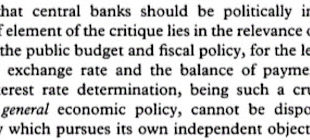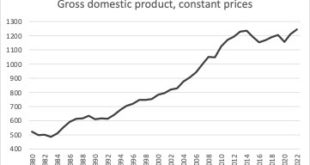Lula da Silva’s return to the presidency in Brazil has opened up the possibility of deepening democracy and expanding the scope of egalitarian advance for the Brazilian working class. In what ways might his administration pursue expansionary fiscal and redistributive policies that would improve the conditions of his political base?In the latest print issue of Catalyst, Matías Vernengo explores the historical and contemporary contours of Brazil’s political economy and outlines how the Lula...
Read More »On central bank independence, and Brazilian monetary policy
The issue is back in the news. This time in Brazil (it was briefly an issue here when Trump did not reappoint Yellen, and then complained about Powell's interest rate where too high). At any rate, I always thought that there were good reasons for skepticism about central bank independence (CBI). As noted by Massimo Pivetti in this old piece on the Maastricht Accord and the, at that time, plan for the euro, the main reason to be doubtful is related to the interaction of monetary policy and...
Read More »What is happening in Brazil
I googled [what the hell is happening in Brazil] and the only ones of the firsts 10 hits on the election are on how the military found no evidence of fraud. (your googling will vary as google shows me what it expects me to click and now knows much more about me than I do). It is very alarming and sad that the military has expressed an opinioni on a matter which is none of their business (I don’t blame the generals, I think they had to, see...
Read More »Lula’s election and what lies ahead
It's been a while since I wrote about the Brazilian crisis (a summary of the previous catastrophic election here). In part that election and the continued crisis explains why I have written less, not just about Brazil. This has been a long economic depression that started in 2015 (see graph), with a coup in 2016 and since 2018 the added problem of a right-wing authoritarian regime that won an election that was only possible with the political proscription of Lula. But at least the political...
Read More »The terrible trade-off: Why less violent cities often means more powerful and organized crime
[unable to retrieve full-text content]More than half the world lives in cities, and a lot of those cities (especially those in the Americas) are plagued with homicides and crime. Americans often think this violence is an individual problem: greed, passions, feuds, and hot reactive thinking drive killers. That’s true to an extent. But this view overlooks something important: that, […] The post The terrible trade-off: Why less violent cities often means more powerful and organized...
Read More »Beyond Vulgar Economics: Conceição Tavares and Heteredox Economics
My paper (in Spanish) for a book on social thinkers in Latin America edited by Marcelo Rougier and Juan Odisio, and that I presented in a few venues since 2020, is now revised and done. The book includes chapters on Raúl Prebisch, Aníbal Pinto, Víctor Urquidi, Celso Furtado, Juan Noyola Vázquez, Helio Jaguaribe, Aldo Ferrer, and Osvaldo Sunkel, besides mine on Maria da Conceição Tavares. A version available here.
Read More »The economics of New Developmentalism
New versus Classical DevelopmentalismNew paper by Tom Palley, titled “The Economics of New Developmentalism: A Critical Assessment” which has been published in Investigacion Economica. Palley argues that "the issues raised will be a key element in the 2022 Brazilian presidential election that will likely pit Ciro Gomes versus Lula in the first round. Gomes aligns with New Developmentalism. Lula inclines to Classical Developmentalism. Of course, economic analysis is just part of the...
Read More »The Pandemic, “Flexible” Work, and Household Labor in Brazil (Interview)
[The following is an interview by Paula Quental of Lygia Sabbag Fares, one of my coauthors for this post on how home quarantine has impacted domestic violence. The interview originally appeared in Portuguese and is posted here with permission.] Labor market deregulation is bad for all workers and even more perverse for women, says economist. According to Lygia Sabbag Fares, a specialist in Labor Economics and Gender Studies, labor reform is a way for the powerful to transfer the burden...
Read More »The Pandemic, “Flexible” Work, and Household Labor in Brazil (Interview)
[The following is an interview by Paula Quental of Lygia Sabbag Fares, one of my coauthors for this post on how home quarantine has impacted domestic violence. The interview originally appeared in Portuguese and is posted here with permission.] Labor market deregulation is bad for all workers and even more perverse for women, says economist. According to Lygia Sabbag Fares, a specialist in Labor Economics and Gender Studies, labor reform is a way for the powerful to transfer the burden...
Read More »Eulogy for Carlos Lessa
I have translated this eulogy on behalf of the Economics Institute of the Federal University of Rio de Janeiro, where I have spent many of my years of economic formation. Carlos Lessa is part of a generation of brilliant Brazilian economists that have shaped the public debate and the discipline in Brazil. This is an effort to pay homage and make more visible the work and life of scholars whose writings are hardly ever translated into English but who are extremely important to our...
Read More » Heterodox
Heterodox




